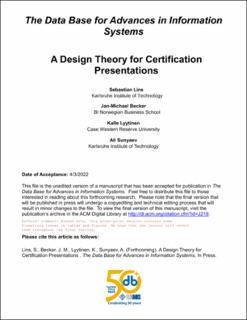A Design Theory for Certification Presentations
Journal article, Peer reviewed
Accepted version
Permanent lenke
https://hdl.handle.net/11250/3098757Utgivelsesdato
2023Metadata
Vis full innførselSamlinger
Originalversjon
Data Base for Advances in Information Systems. 2023, 54 (3), 75-118. 10.1145/3614178.3614183Sammendrag
Prior information system research remains inconsistent of the effects of system certifications. In their current use, certifications are often reduced to graphical seals. This approach fails to incorporate detailed assurance information emanating from the certification process. To address this gap, we adopt a design science approach and deploy a four-phase research design to clarify how to design impactful IS certification presentations. First, we identify sources of users’ limited understanding of seals and formulate a design proposal for a certification presentation by drawing upon the elaboration likelihood model. In the second phase, we formulate and validate a set of design meta-requirements and guidelines to improve certification presentation, using cognitive load theory and Toulmin’s model of argumentation as kernel theories. In the third phase, new certification presentations that comply with the proposed guidelines are developed and evaluated for their effectiveness. We show that presentations that augment seal-based certification presentations with richer assurance information improve certification effectiveness. This increases users’ assurance and trust perceptions when the presentations align with the users’ cognitive information processing needs in ways that reduce their cognitive load and enhance argument quality of assurance information. A Design Theory for Certification Presentations
